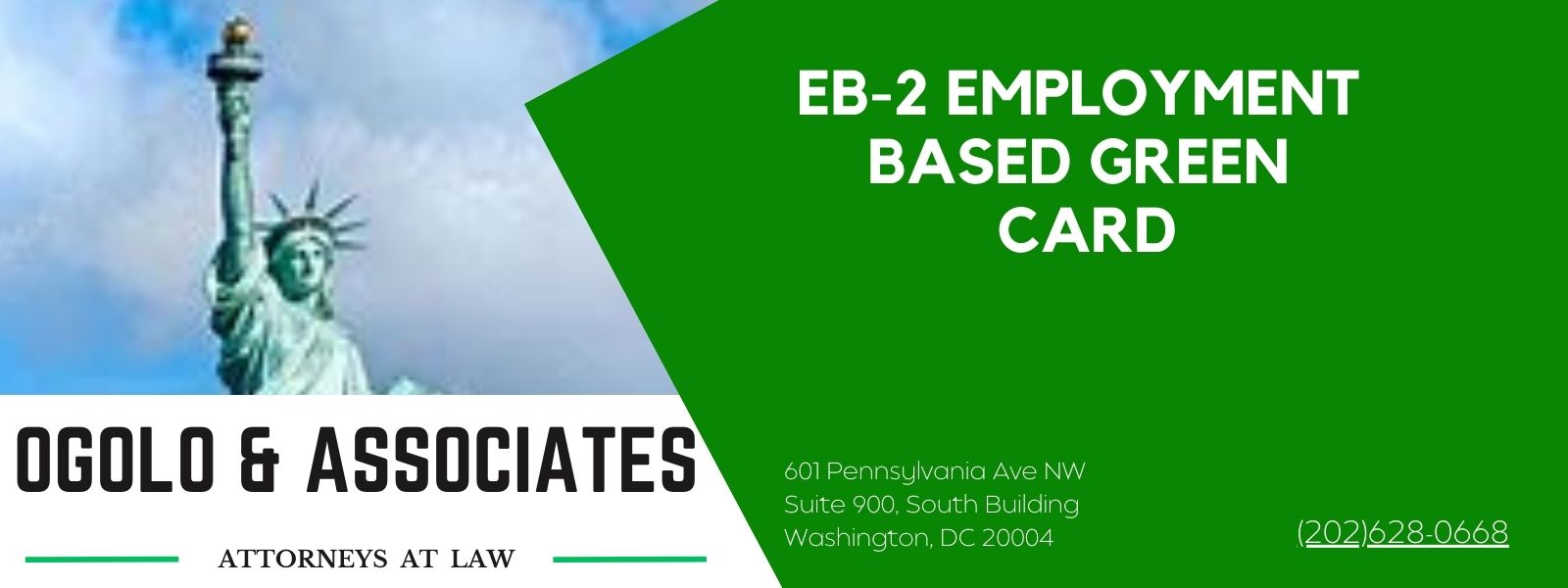There are essentially two avenues to acquiring permanent residence status in the United States. One avenue is through family sponsorship. This category is further subdivided into spousal sponsorship, parent-child sponsorship and sibling sponsorship. The second avenue is employment sponsorship. It consists of EB-1, EB-2, EB-3, EB-4 and EB-5. Some of this subcategories require sponsorship by an employer, whether corporate or individual. There are other employment based subcategories that do not require corporate sponsorship. EB-2 is a hybrid in that it’s subdivided into (1) advanced degree holders and (2) exceptional ability applicants. Advanced degree holders require employment sponsorship whereas exceptional ability applicants do not require sponsorship.
EB-2 stands for employment-based, second preference visa or green card. One does not have to be physically present in the United states to apply for EB-2 visa. You may apply for EB-2 whether you are physically in the United States or abroad. You do not have to be physically in the United States to apply for EB-2 whether you require corporate sponsorship or not. You may be eligible for EB-2 if you are a member of the professions holding advanced degree or its equivalent, or you possess exceptional ability in the sciences, arts, or business.
ADVANCED DEGREE HOLDERS
To satisfy the advanced degree requirement, you must have a Master’s degree or higher, such as PhD, MD, JD, etc. or you have a bachelor’s degree with at least five years of progressive work experience in your field. For documentation, you have to provide official academic record showing that you have a United States advanced degree or a foreign equivalent degree or an official academic record showing that you have a U.S. bachelor’s degree or a foreign equivalent degree and letters from your current or former employers showing that you have at least five years of progressive post bachelor degree work experience in your specialty.
EXCEPTIONAL ABILITY APPLICANTS
Those who can show exceptional ability in the sciences, arts, or business can apply for adjustment of status based on EB-2. To qualify, one has to show “ a degree of expertise significantly above that ordinarily encountered in the sciences, arts or business”. To qualify, you must meet at least three of the criteria listed below:
-
Official academic report that you have a degree, diploma, certificate or similar award from a college, university, school or other institution of learning relating to your area of exceptional ability
-
Letters documenting at least ten years of full-time experience in your occupation
-
A license to practice your profession or certification for your profession or occupation
-
Evidence that you have commanded a salary or other remuneration for services that demonstrate your exceptional ability
-
Membership in a professional association(s)
-
Recognition for your achievements and significant contributions to your industry or field by your peers, government entities, professional or business organizations
-
Other comparable evidence of eligibility for such classification
PERMANENT EMPLOYMENT CERTIFICATION
Generally, employment based, second-preference petitions must usually be accompanied by an approved Application for Permanent Employment Certification from the Department of Labor on ETA Form 9089. The purpose of labor certification is to ensure that there are no United States citizens and/or permanent residents that are qualified and available for the job. If the Department of Labor determines that there are qualified United States citizens and/or permanent residents, labor certification will not be issued and thus the employer and the alien cannot proceed with the request for employment/green card based on EB-2. As part of the the labor certification process, the sponsoring employer must offer prevailing wage to the intending alien employee. Also, the employer must prove ability to pay the prevailing wage to the alien. The reason for this requirement is two fold. One, to ensure that the employers are not depressing wages by hiring aliens and secondly, that the employers have the ability to pay the prevailing wages for the position. The requirement for labor certification may be waived if the employer/alien is able to secure national interest waiver.
NATIONAL INTEREST WAIVER
Aliens and/or employers seeking national interest waiver are essentially requesting that the requirement for labor certification be waived because it is in the interest of the United States to hire the alien for the position. The statutes do not define or categorize jobs that qualify for national interest waiver. However, national interest waivers are usually granted to those who have exhibited exceptional ability in their specialty and whose employment will greatly benefit the United States. Those seeking national interest waiver do not require employment or employer sponsorship. They may apply directly to the United States Citizenship and Immigration Services rather than first applying for labor certification through the United States Department of Labor. Specifically, the applicant must demonstrate the following:
-
The proposed endeavor has both substantial merit and national importance
-
The applicant is well positioned to advance the proposed endeavor
-
It would be beneficial to the United States to waive the requirements of a job offer, the labor certification from the Department of Labor.
National interest waiver may be requested whether one is proceeding as an advanced degree holder or as an exceptional ability applicant.

